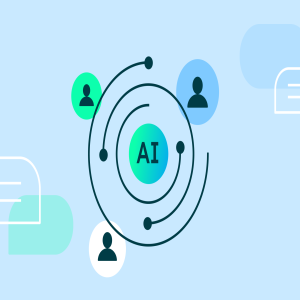Design for learning, not just for integrity. That was the clarion call from education leaders at Turnitin’s recent executive customer roundtables.
As generative AI becomes more sophisticated and less controllable, academic leaders are shifting from reactive policies that detect AI misuse to proactively designing assessments that prevent it. It is assessment reimagined, where learning and ethics are assessed, not just outputs.
New assessment design strategies highlight the learning process, not just the product of learning, which can be easily generated using AI. This protects authentic academic outcomes, scaffolds students’ AI literacy and ethics, and delivers stronger prospects for learners and graduates in the AI-ready era.
These research- and practice-backed insights come from Turnitin’s executive customer roundtables, which provide a rare forum for senior education leaders to discuss innovation in institutional strategy.
During this year's executive customer roundtables, Turnitin's leadership facilitated discussions about how process-focused assessment could protect academic integrity, and how technology is supporting this evolution.
Get the full picture
This article is 2 of 3 arising from our executive roundtables.
- Article one: Strategies for AI governance
- Article two: A new focus for assessment design (you are here)
- Article three: Adapting AI for learning
Process-focused assessment that makes learning visible
The growing sophistication of generative AI, combined with the need to nurture students’ AI literacy for workforce readiness, means that preventing AI use is no longer a valid institutional strategy.
Instead, education leaders are focusing on integrating AI ethically into learning workflows, while discouraging misuse through AI education and process-focused assessment design.
One approach emerging from our exclusive executive roundtables was practice-based assessment; strategies that shift the focus from assessing the product of learning to the process of learning. This approach is not new pedagogically – it applies the familiar ‘show your work’ principle from mathematics to other disciplines – but widening adoption demonstrates its value in the generative AI era.
Presenters in Australia explored how assessments rooted in process help maintain integrity while embracing AI, particularly highlighting:
- Interactive orals: Live sessions where students articulate their reasoning, solve problems, and apply knowledge in real-time.
- Portfolios: Collections of drafts, reflections, and revisions over time – often in response to educator formative feedback – that document progress and skill development.
- Scaffolded reflections: Assignments that prompt students to record decisions, explain approaches, and reinforcing metacognition and personal accountability for learning.
These strategies do more than deter inappropriate AI use. They help students appreciate the value of the learning process itself, encouraging ethical AI use to support their work, while naturally reducing the risk of academic misconduct.
Global frameworks to protect learning and assessment
Beyond practical examples, roundtable discussions highlighted emerging research-backed frameworks that guide assessment design.
GenAI at Melbourne University
The University of Melbourne focuses on embedding generative AI in higher education assessment design. It encourages aligning assessment tasks with both learning outcomes and AI-related competencies, while promoting process visibility, student reflection, and transparent reporting of AI use.
They highlight that: ‘AI platforms present a multitude of new issues for both educators and learners, however, it is important to remember the purpose of assessment as the search for evidence of learning. Well-designed assessments will provide valuable evidence to support both learners and educators in their respective roles to learn and teach. Educators should consider the following questions:
- What are the intended learning outcomes (ILOs) of the subject?
- How can students demonstrate their learning if they are collaborating with a generative platform such as ChatGPT?
- Can tasks be designed to focus on higher levels of cognitive thinking?’
This focus shifts from AI prevention to proactive inclusion: helping students evidence how they use AI to inform, rather than bypass, their thinking.
IEPAR Model (Dubai)
The IEPAR modelfocuses on inspiration, education, pedagogical considerations, assessment design, response, and restorative practice. Originating in the UAE, it has global application.
It creates a positive cycle that inspires good practice, design assessments that uphold this, and provides restorative processes in response to missteps. IEPAR creates a learning landscape where integrity is embedded from the start, rather than policed at the end, fostering a culture of academic integrity in higher education through responsible training of all stakeholders.
Across all regions, the message was consistent: design for learning, not just integrity. These frameworks provide leaders with structured approaches to create assessments that capture student thinking, support AI literacy, and preserve authenticity.
From suspicion to support: Technology empowering the shift
To support educators’ design for learning, technology is evolving in parallel with assessment design. Turnitin leaders were delighted to introduce new functionality in our assessment tools, Turnitin Clarity.
This provides enhanced visibility into the student composition process through a controlled writing environment supported with optional AI tools, as well as a suite of time-saving assessment and feedback tools for educators.
Participants discussed Turnitin Clarity’s:
- Intuitive insights into composition practices and AI use for ethical guidance and real-time interventions to prevent misuse or overeliance.
- Customizable student AI assistance such as structure, argument, and grammar feedback, which helps students refine their writing prior to submission, supporting student skill development and freeing educators for higher-value feedback .
- Potential for improvements to feedback speed and quality with tools such as video playback of the student writing process, and flags for work that may need additional attention.
Participants praised Turnitin Clarity for making the learning process transparent while reducing dependency on external tools. By seeing drafts, reflections, and iterations, educators can mentor students, nurture integrity, and support ethical AI use.
Feedback delivered through Turnitin Clarity is increasingly personalized and actionable, enhancing engagement and accelerating skill development. In this way, technology does not simply detect or prevent misuse; it supports the broader shift toward reflective learning, process-focused assessment, and advanced pedagogy in AI.
Key takeaways: Assessment reimagined
The Turnitin executive customer roundtables highlight a key change: academic integrity in the AI era is designed, not detected. Senior education leaders are moving beyond reactive, compliance-focused approaches, instead adopting assessments that make learning visible, embed reflection, and foster authentic engagement.
- Design for academic integrity in assessment, don’t just police it.
- Support ethical AI literacy and academic integrity through process-focused assessment design.
- Free educators for more impactful feedback through student self-serve AI tools, and intuitive assessment tools for teachers.
Tools like Turnitin Clarity make this approach scalable, giving educators the visibility and control needed to mentor students, scaffold AI literacy, and support ethical use of generative technologies.
The message from the roundtables is clear: integrity is no longer enforced after the fact. It is designed into learning, nurtured through structured assessment, guided reflection, and supported by technology that makes the learning journey transparent, meaningful, and accountable.
Join fellow thought leaders at Turnitin’s next executive customer roundtable
Are you a senior leader and Turnitin customer interested in joining the conversation and convene with fellow education thought leaders to discuss the future of education?
Complete this short form to be notified when a space becomes available at a forthcoming event. ⬇️





